Netflix data leak: what happened and what you should do to secure your account

It seems like there is a new data breach every week, and streaming services are often involved.
In the past year alone, billions of user credentials have been exposed through infostealer malware, phishing campaigns, and unsecured databases. Netflix hacked accounts data is among the most frequently found in these security incidents, putting users at risk of account takeover, identity theft, and financial fraud.
In this article, we’ll break down the Netflix data leak incidents—from unreleased shows leaked by a third-party vendor to millions of user credentials stolen through malware campaigns. We’ll explore what data was exposed, how to check if your account was compromised, and how to secure your streaming accounts moving forward.
Did Netflix get hacked?
Netflix is one of those platforms whose core systems haven’t been breached per se, but its user data appeared in external data breaches. All the Netflix leaks are tied to third-party vendors with poor security or attacks using infostealer malware.
Let’s dive into what happened, starting from the most recent, larger-than-ever data breach.
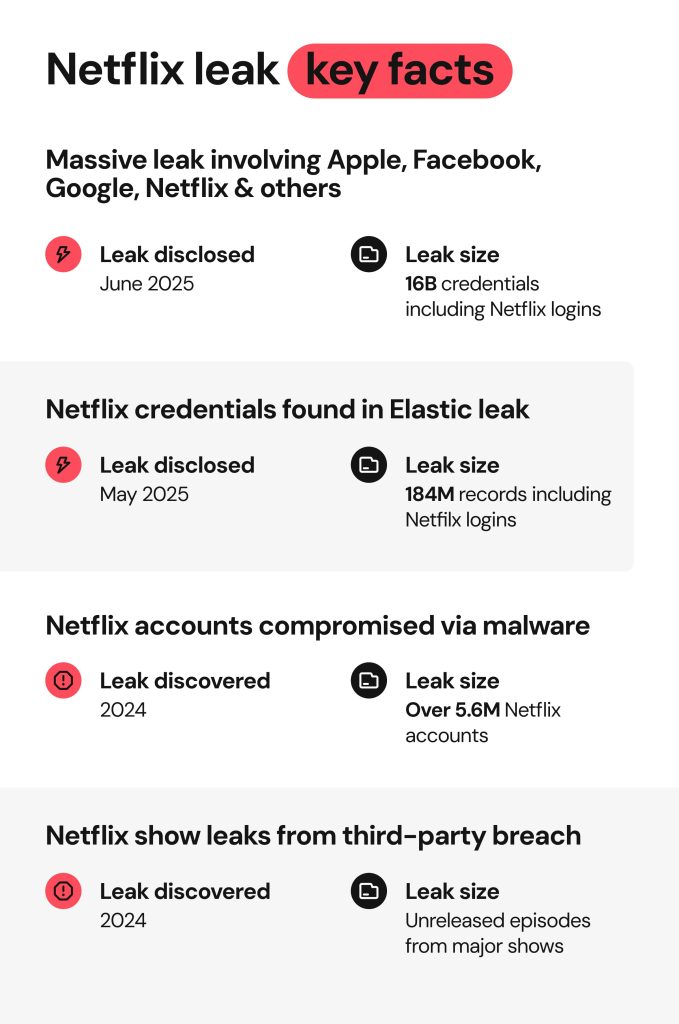
June 2025: record-breaking breach exposes 16 billion credentials including Netflix logins
In June 2025, cybersecurity researchers uncovered a massive data leak containing 16 billion credentials—nearly twice the number of people on Earth. It’s already being called one of the largest credential exposures in cybersecurity history.
So, what exactly happened? The scale of the breach suggests it wasn’t the result of a single platform being compromised. Instead, experts believe the data was gathered through infostealer malware, the type of malicious software designed to quietly harvest sensitive information from infected devices.
For example, clicking a phishing link or downloading a rogue extension could infect your device. Once installed, the malware scans for login credentials, banking details, session cookies, and browsing history. That data is then exfiltrated, sorted into databases, and often sold or traded on dark web forums.
Researchers discovered over 30 exposed databases, ranging from tens of millions to 3.5 billion records. While there was likely overlap, the leaked data contained login credentials for a wide range of services, Netflix included. The exposed records also contained logins tied to Apple, Google, Microsoft, Facebook, Instagram, Telegram, PayPal, VPN services, and even government portals.
May 2025: Netflix account credentials compromised among 184 million records
In May 2025, a cybersecurity researcher Jeremiah Fowler discovered an exposed Elastic database containing approximately 184 million records. The dataset included login credentials linked to Netflix, Microsoft, Google, as well as compromised Facebook user details, exposed PayPal account data and ID info tied to Apple and several government platforms.
The database was left unprotected, exposed to the open web. Fowler immediately reported it to the responsible hosting provider, World Host Group. It was quickly taken down, but there is no way of telling how long it was exposed and whether bad actors had a chance to copy it.
Fowler also noted that the data seem to be collected by an infostealer. So far, there are no signs that the compromised info was misused or sold on the dark web.
Late 2024: over 5 million Netflix accounts compromised via malware
Kaspersky, a global cybersecurity firm, investigated stolen credentials linked to major streaming platforms. According to their 2024 report, over 5 million Netflix accounts were exposed, with most of the affected users located in Brazil, Mexico, and India.
And that wasn’t the full extent of their findings. Kaspersky uncovered a total of 7 million exposed credentials across streaming services. Netflix made up the majority, while the rest belonged to Disney+, Amazon Prime Video, Max, Apple TV+, and others.
It’s important to note that these accounts weren’t compromised in a direct Netflix breach. Instead, they were collected through phishing, infostealers, unofficial browser extensions, and apps.
August 2024: unreleased Netflix shows leaked after third-party vendor breach
Back in August 2024, it all started with a bunch of Netflix TV shows getting leaked. According to Netflix, the leak originated from a post-production partner, Iyuno.
It’s not clear what exactly happened on their end, except that the third-party vendor suffered a “security issue, involving unauthorized access to confidential content.” Netflix immediately launched an investigation.
Footage with watermarks and timestamps, in low resolution, was posted on Twitter, TikTok, torrent sites, and 4Chan.
The affected titles included Stranger Things, Arcane, Heartstopper, Spellbound, Dandadan, Jentry Chau vs. the Underworld, Plankton: The Movie, Mononoke the Movie: Phantom in the Rain, Terminator Zero, and Ranma 1/2, and potentially others.
What data was compromised in Netflix data leaks and how it can be exploited
Exposed data always varies by incident. However, a few of the Netflix data leaks were presumably carried out by infostealer malware, which collects a particular sort of information. Here is a detailed breakdown:
| Incident | Data types exposed |
|---|---|
| June 2025 | Login credentials for Netflix and other platforms (email addresses, usernames, and plaintext passwords); Session metadata: cookies and tokens Data stolen via spyware, phishing pages, and rogue browser extensions. |
| May 2025 | Login credentials for Netflix and other platforms; URLs tied to login portals; Session metadata: cookies and tokens . |
| Late 2024 | Login credentials for Netflix and other platforms; URLs tied to login portals; Session metadata: cookies and tokens; Personal information from infected devices: email addresses, payment information, and more. |
| August 2024 | Full unreleased episodes, raw animation files, watermarked low-resolution footage. |
You might be wondering: why does this matter? Netflix is just a streaming platform. However, Netflix leaks carry risks as any other data breach.
- Unauthorized access. Bad actors can use the login information to hijack your Netflix user session. Cookies and tokens can be used to bypass multi-factor authentication (MFA).
- Identity theft. Fraudsters can use your leaked personal information to steal your identity.
- Financial fraud. By accessing your Netflix account, scammers may also view your payment information. If you reused your Netflix password on payment platforms, hackers may have direct access to your finances.
Public reaction and Netflix’s response
Netflix acknowledged that the upcoming episodes of popular TV shows had been leaked via a third-party service provider in August 2024. This was probably the most benign of all cyberattacks. However, they didn’t comment on user login credentials being compromised.
Many users were facing trouble because of the Netflix leaks. Some reported their accounts being hijacked, new devices added, language changed, and billing modifications (changing the payment method or plan).
“So someone managed to access my account and was able to change my email, number and password without me even knowing. How on earth does this even happen without me receiving a single email/ text informing me of what is going on?”, a Reddit user wrote.
On a positive note, the customer service seems to be helpful, according to most Netflix users who voiced their concerns online.
Is your Netflix account at risk?
Signs your Netflix account has been compromised
Unusual activity is a telltale sign that something is off with your Netflix account. Look out for the following signs.
- You’re logged out unexpectedly. And we don’t mean having to confirm that you are part of your household, which happens pretty often for some people.
- A new profile has been added to your account. Or, an existing profile is renamed or deleted.
- Your account is suddenly using a new language.
- Your billing info is updated.
- Your membership plan has changed (typically to a more expensive one).
Even if you don’t log into Netflix often, check your email regularly. Netflix should send you notifications about the account changes being made.
What to do if your Netflix account was hacked
If you think your Netflix account has been hacked, don’t panic. Below are the immediate steps you can take to secure your information. Netflix offers some good advice on this, as well.
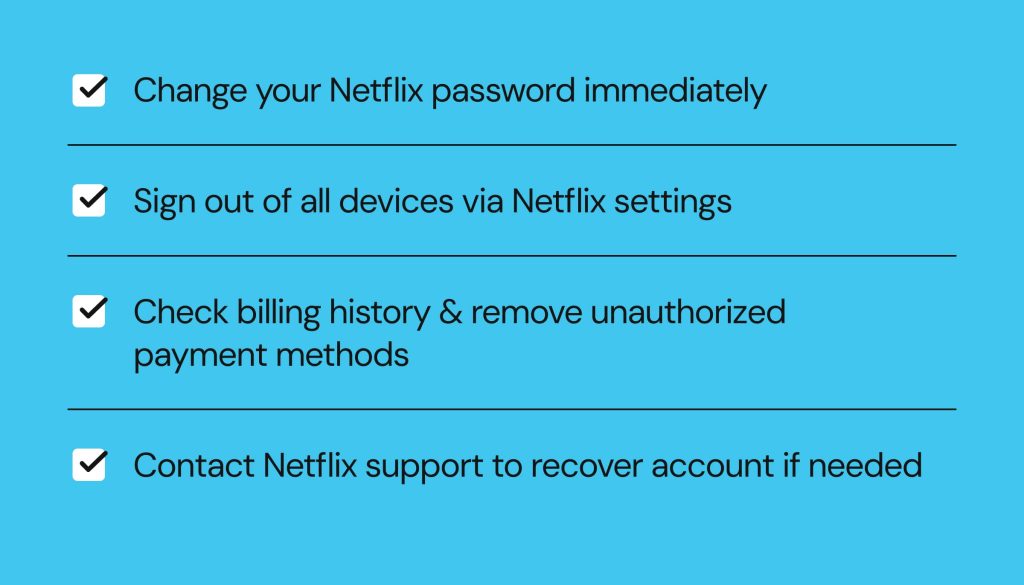
Change your Netflix password immediately (from a clean, malware-free device)
First things first, you’ll need to change your Netflix password. It’s also a good idea to change your email password and passwords of any other platforms secured with the same, reused Netflix password.
Make sure to create a new, unique password that is:
- At least 8 characters long
- Using a mix of uppercase and lowercase letters, symbols, and numbers
- Not a pattern, birthday, or anything easily guessable
Another important point is using a device that is malware-free. If your computer or phone is infected with an infostealer, hackers will see the new password you create. Make sure to clean up your device first or use a new one to reset your Netflix password.
Sign out of all devices via Netflix settings
If your Netflix account has been compromised, it’s safe to assume a new device has been added to your account. As you can’t be sure which one it is, it’s best to sign out all of them (except for the one you are currently using). Just head over to the Manage Access & Devices page and remove the devices.
Check billing history and remove unauthorized payment methods
Next, check if someone meddled with your payment information and membership plan. Head over to review your payment methods and plans. If any changes were made, revert back to the original settings.
Contact Netflix support to recover your account if needed
If you notice changes in activity that you can’t fix by yourself, or somebody keeps adding new accounts and changing your settings, it’s time to contact Netflix customer support through their Help Center. Try to describe the situation in detail, so CS agents can find the best way to help you.
How to protect your Netflix and other streaming accounts
Even if your Netflix account wasn’t compromised, you might be concerned about the news of all these data leaks. Don’t worry, we are here to help. The good news is that there are steps you can take to proactively protect yourself .
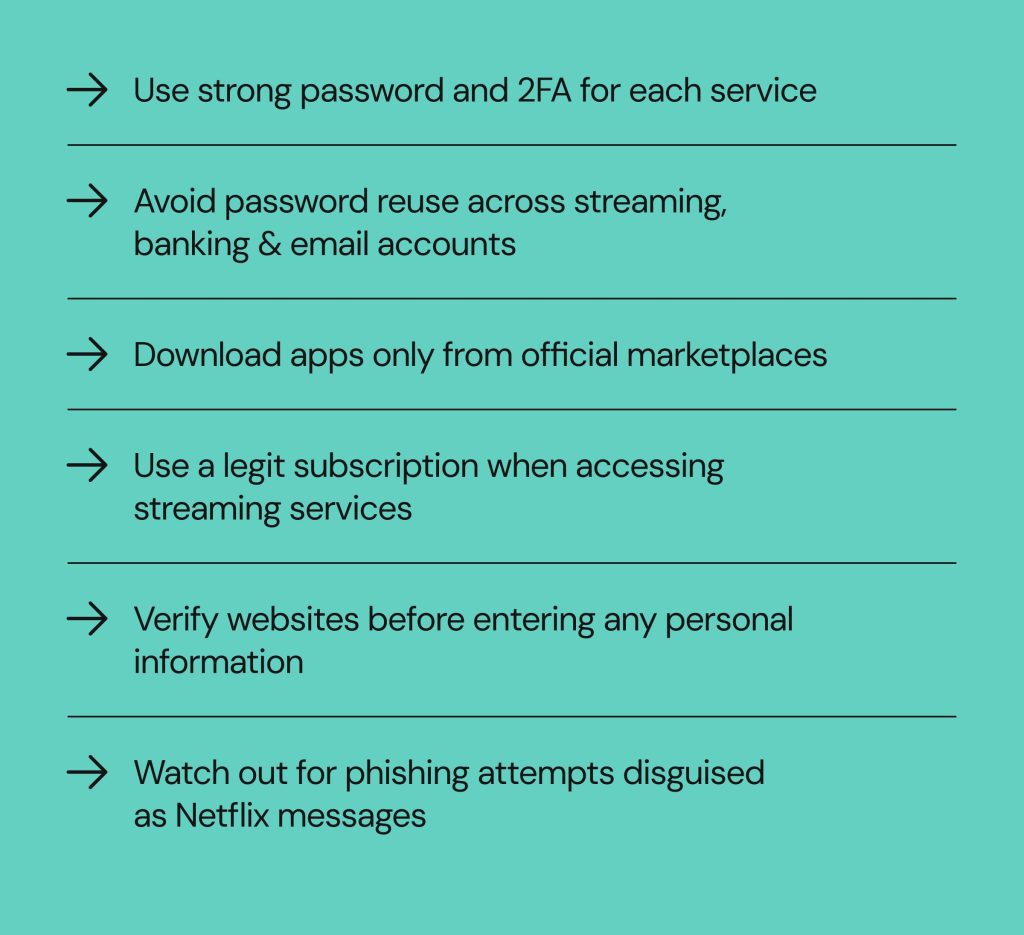
Use a strong password and 2FA for each service
Whether it’s Netflix, Max, or any other streaming service, it deserves a unique and strong password. We already covered how you can set up a complex password above. Remember that you can also add 2FA for most streaming services, which will make your account even safer.
Avoid password reuse across streaming, banking, and email accounts
We really can’t stress enough the importance of a unique password. Hackers must be thrilled to see stolen credentials open up a dozen new platforms! If everyone created a separate password for each service, they’d have to abandon credential stuffing altogether.
It’s crucial for your payment apps and email to be properly secured with unique passwords. This will protect you from financial fraud and ID theft in case of any new data breaches.
Download apps only from official marketplaces
As you’ve seen, unauthorized apps can cause a lot of damage. When you download software that’s not on App Store or Play Store (likely because of their security criteria), it may infect your device and collect data. Opt for verified apps instead.
Use a legit subscription when accessing streaming services
Stay away from third-party subscriptions or any pirated and “cracked” versions of streaming service platforms. These may be full-on phishing scams and contain malware. They are also not likely to integrate important security updates (that official apps do) and, if anything happens, you won’t be able to contact customer support.
Verify websites before entering any personal information
Hackers can create a website that looks just like Netflix, except that it isn’t the real one. This too is a form of phishing, and there will be signs that are easy to miss, such as the URL being different.
Before entering your login credentials or banking details, make sure that you are using the actual Netflix platform. Otherwise, hackers will gain access to your sensitive information.
Watch out for phishing attempts disguised as Netflix messages
We covered fake subscriptions and websites, but scams don’t stop there. Some users receive fake emails from Netflix or get a call from a pretend Netflix CS agent. In most cases, you will be prompted to click on links, download attachments, and reveal your login credentials, as well as personal and payment information.
Remember to stop and think before taking any action. Would Netflix send you that email? Would their CS agent call you out of the blue? By their own account, Netflix will never ask you to disclose your credit or debit card numbers, bank account details, or Netflix password via text or email, or through 3rd party vendors.
How Onerep can help you fight your data exposure
Did you know that data broker websites collect your publicly available information (the stuff you post on your socials, for example)? Your full name, DOB, and street address might be out there for everyone to see. Even scammers use these websites to learn more about their potential targets.
Onerep scans over 230 data broker websites and lets you know which sites expose your information. Then, we get it taken down for you and continuously monitor these websites to make sure your information stays private. This protects you from targeted phishing, ID theft, and other types of fraud.
FAQs
Has Netflix had a data breach?
Netflix’s core systems have never been breached. But Netflix was part of a few cybersecurity incidents. TV shows were leaked, and customer login credentials were exposed as part of large-scale data leaks.
What does it mean if it says your password has appeared in a data leak?
If your password has appeared in a data leak, your associated account might be compromised. This puts you at risk for financial fraud and ID theft. Make sure to change your passwords immediately.
Was my account included in the Netflix leak?
If your account was included in a Netflix security breach, you might receive a notification from Netflix or notice suspicious activity on your account. You can also check if your email was compromised in a data breach through HaveIBeenPwned.
Is Netflix secure?
Netflix has never been breached, which makes it fairly safe to use. Still, cybersecurity incidents happen, and streaming services are taking a hit. No platform is fully secure, regardless of how large or famous it is.
How can I check if my Netflix account was compromised?
Check your account for unusual activity. First, see where your account is being used. Are there any unfamiliar devices, locations, or IP addresses? Then, check if your viewing history includes new shows or movies that you didn’t watch. Head over to your email for security alerts from Netflix, such as notifications about new logins or password changes. You can also use HaveIBeenPwned to see if your email has appeared in a data breach.


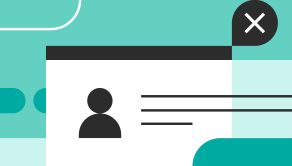

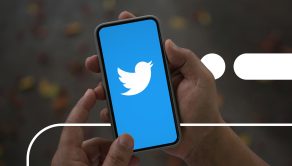
Mikalai is a Chief Technical Officer at Onerep. With a degree in Computer Science, he headed the developer team that automated the previously manual process of removing personal information from data brokers, making Onerep the industry’s first fully automated tool to bulk-remove unauthorized profiles from the internet.